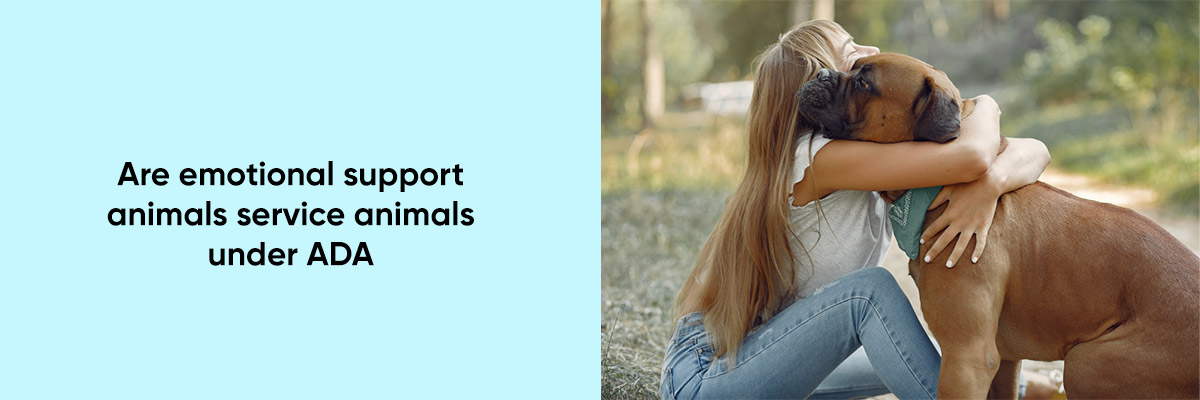So, you might be confused if all the animals can be considered as assistive or service animals and hence approved by ADA. Then let me tell you, the answer is “NO”.
In this blog, I will help you to clear up this confusion about emotional support, and service animals. However, if you want to get the solutions to your problems that I might miss then you can check out our webinar.
First thing first, let’s understand the basic difference between assistive and emotional support animals.
Difference Between Assistive And Emotional Support Animals:
| Basis Of Difference | Assistive Animal | Emotional Support Animal |
| Definition | There are service animals that do work or perform tasks for people with disabilities. They’re usually dogs and miniature horses. | Individuals with disabilities get comfort and emotional support from emotional support animals. Different kinds of domesticated animals can be included in ESAs besides dogs. |
| Tasks | The task of a service animal is directly related to their handler’s disability. The tasks help people with disabilities get through their day-to-day lives. | An emotional support animal can’t perform specific tasks for a person with a disability, like a service animal can. They provide emotional comfort and support just by being there. |
| Examples of Tasks | Guidance for blind people, hearing assistance for deaf people, pulling wheelchairs, helping people during seizures, reminding people to take their medication, calming people who have PTSD during anxiety attacks. | An ESA can provide companionship, reduce loneliness, and alleviate symptoms associated with mental health conditions. The dogs aren’t trained to help with specific physical tasks, but their presence is considered therapeutic. |
| Legal Protections | Service animals are granted certain rights under the Americans with Disabilities Act (ADA), including access to public places, transportation, and housing. | Although ESAs aren’t considered service animals under the ADA, they’re protected under the Fair Housing Act (FHA) and the Air Carrier Access Act (ACAA), which allows them to live with their owners in housing and accompany them on plane rides. However, you should check your local state laws for this. |
Understanding ADA Assistive Animals and Emotional Support Animals
ADA approves all those animals who are trained to help the person with disabilities in doing their daily activities like picking up things if a person uses a wheelchair, helping the person to assist in giving directions in the house, local markets, roads, etc., if they help the person to get alert with actions if they can’t hear, etc.
So, if your dog or cat is not trained to do a specific task that you can do all by yourself then ADA doesn’t consider that pet as assistive. So, by just being there with you for your emotional support is not enough.
However, you should check your local and state laws which might approve emotional support animals as assistive.
ADA Laws For Assistive Animals
Here are some of the laws that every assistive animal has to follow:
- Trained to do a specific task:
- The ADA defines a service animal as a dog, cat, miniature horse, etc., that is individually trained to perform tasks or do work for individuals with disabilities. An important distinction here is that the animal must be trained to perform tasks directly related to the individual’s disability.
- For example, a guide dog might assist someone with a visual impairment in navigating their surroundings
- Must be vaccinated:
- There is no specific vaccination requirement for service animals in the ADA, but individual states and local governments may have their own requirements. As a general rule, owners of service animals are responsible for ensuring that their animals are vaccinated to prevent the spread of diseases.
- When renting an apartment, some landlords or businesses might ask for proof of vaccination.
- Needed to be controlled:
- Per the ADA, service animals must always be under the control of their handlers. It means the animal needs to be harnessed, leashed, or tethered, unless doing so interferes with the person’s disability or it’s impossible because of the way the animal is trained to do its job.
- Handlers need to keep control over service animals so disruptions don’t happen. A service animal may be removed from a facility if it’s unruly or uncontrolled.
Final Words:
Legal obligations are nuanced when it comes to no-pet policies and service animals in rental housing. While landlords can enforce no-pet policies, they have to make exceptions for people with disabilities who rely on service animals. It’s important to strike a balance between property management and respecting disabled people’s rights. Tenants and landlords need to know their rights and responsibilities as awareness grows and legal frameworks change.


